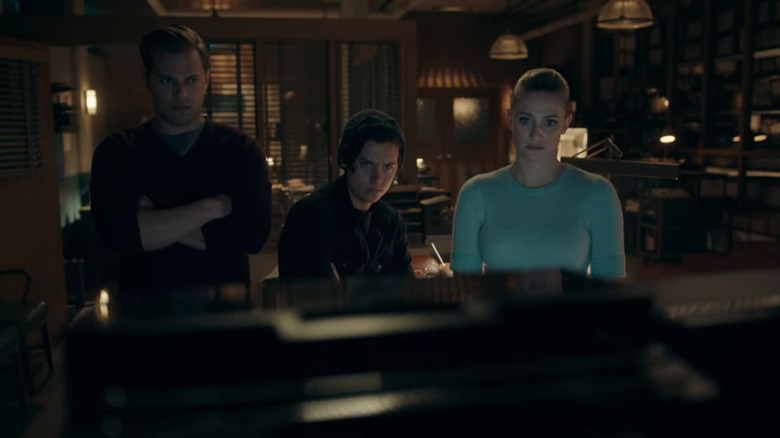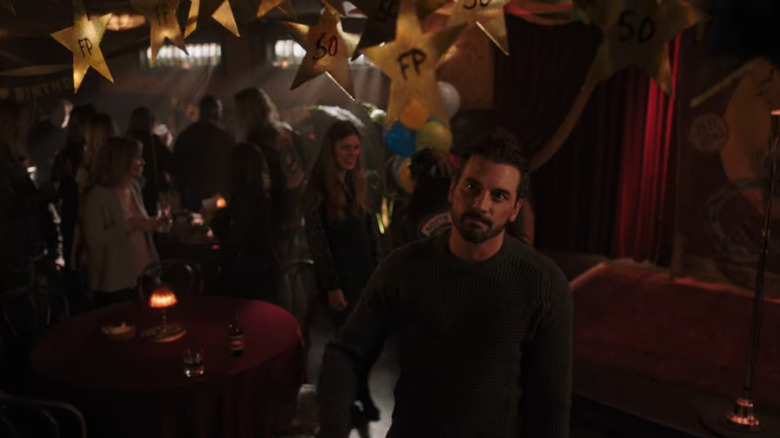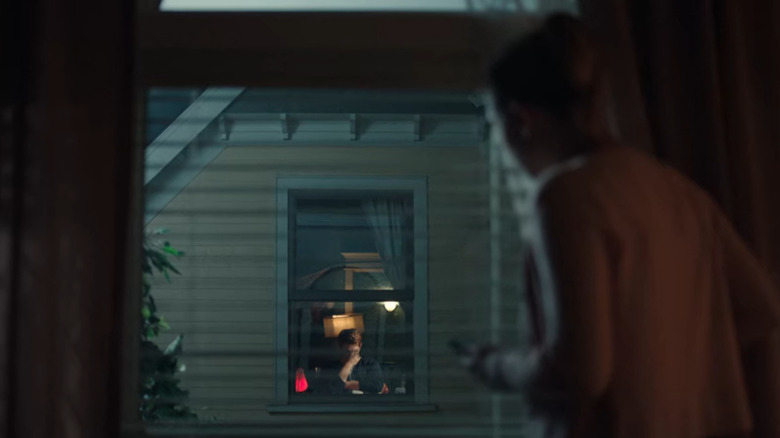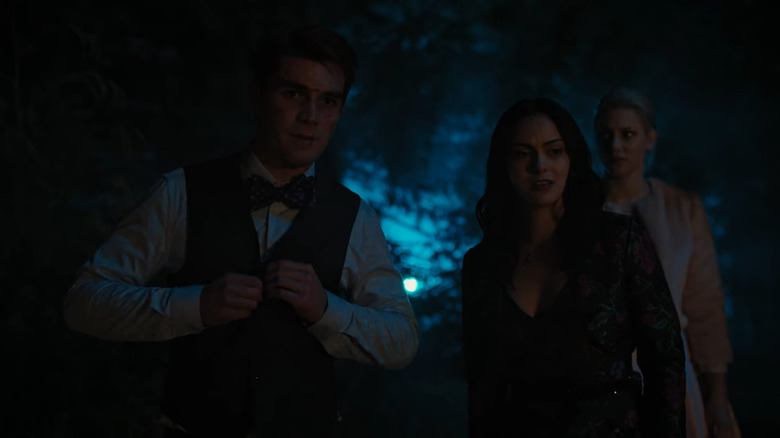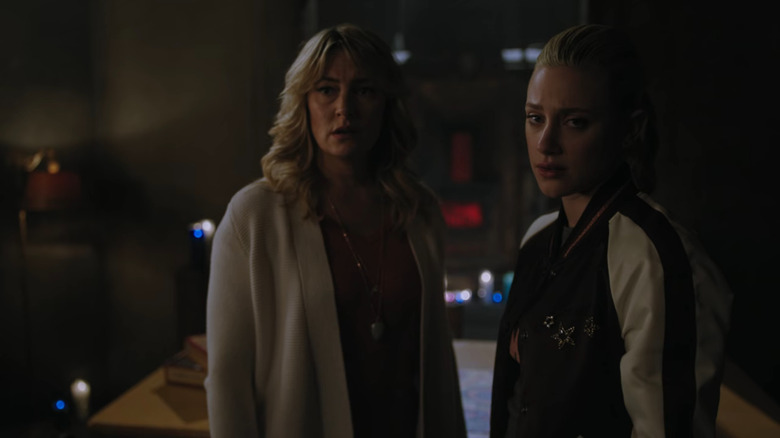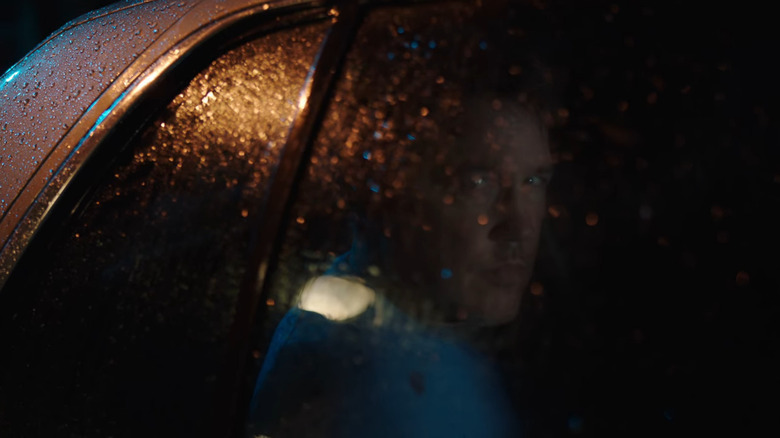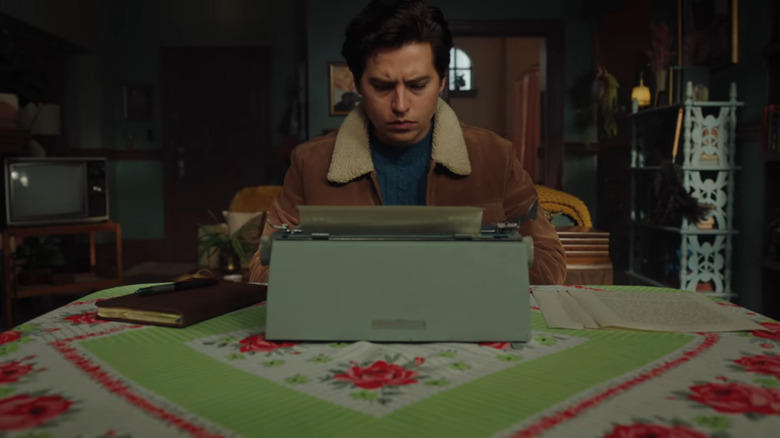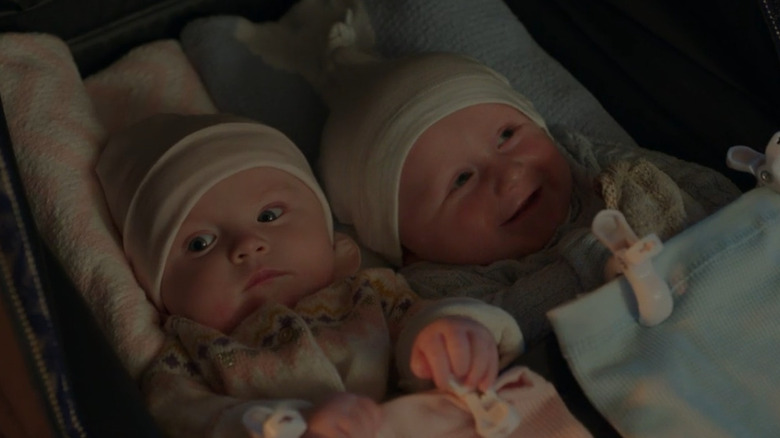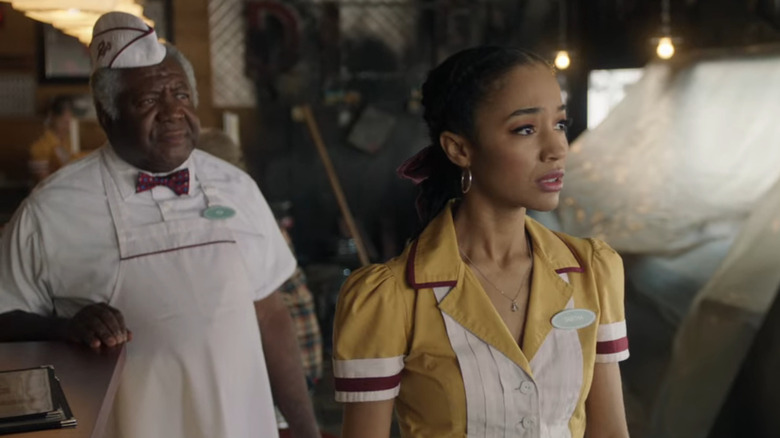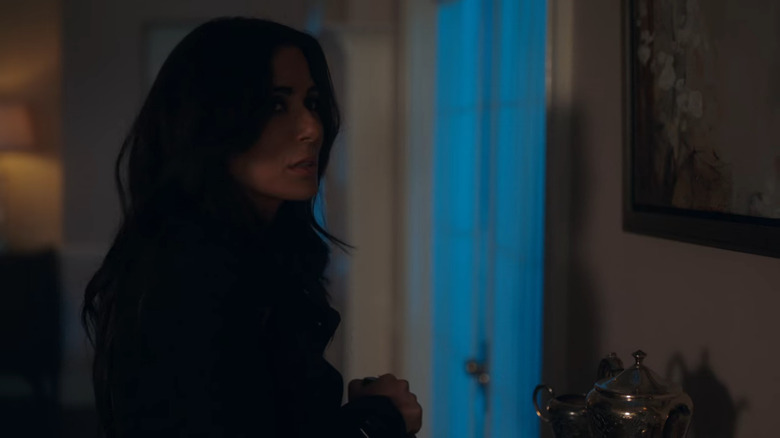Riverdale Plot Holes We Still Can't Explain
Demanding deadlines and the need to juggle several plots at once haven't made serial writing any easier, particularly in the fast-paced realm of TV. Still, when it comes to storylines that just get dropped on occasion, never to be mentioned again, few ongoing series have accumulated the sheer number that "Riverdale" has. Naturally, a mistake here and there is to be expected in this wild Archie Comics-meets-"Twin Peaks" adaptation, but there are moments when a simple plot hole on "Riverdale" widens into a plot grand canyon.
With its seventh and final season around the corner, "Riverdale" is all but guaranteed to revisit at least a couple of these along the way, but due to the lightning-quick plot developments of the show's more recent seasons, some of these already feel like the distant past, back in the halcyon days before the sixth season's Rivervale parallel universe, "Sabrina" crossovers, Archie multiverses, and Cheryl Blossom going full Dark Phoenix for a little while there. Yet a big part of the fun of "Riverdale" is its wild, off-the-rails way of pulling us through major pop culture references and tropes, which is why it's no surprise whatsoever that there's a dropped thread or two (dozen) over its run. Wondering what became of them is just as entertaining as any other part of the show, so let's get into it.
The serial killer gene
The idea of a "serial killer gene" is based very loosely on the theory of the so-called "warrior gene," which supposedly reduces impulse control. Given the dearth of evidence supporting the theory and the problematic nature of genetic prediction, though, it's best left to the realm of fiction. Enter "Riverdale." In the third season, Betty Cooper's mother Alice reveals that Betty has inherited the "serial killer gene," which in and of itself is a pretty wild thing to drop on an otherwise pretty normal teenager. Yet that's only the beginning of this bizarre subplot.
The easily rattled Betty experiences an identity crisis as she mines her memories for signs she might have missed that she'll become a serial killer. She's disturbed by what she finds. Though we later discover that much of this is simply confirmation bias from a young woman troubled by her own potential for evil, there are a couple of serial killers in Betty's family after all. Her father Hal was revealed as The Black Hood in the second season, a masked killer who orchestrated a series of silly-but-scary series of crimes around Riverdale. We also discover that Betty's surprise brother Charles has also inherited the gene and has been going around killing bad guys, "Dexter"-style. Plot hole, Charles isn't related to Hal, so where did that gene come from? Oh, will you look at that, we're out of time. Moving on...
How is FP 50?
This is a mistake that we're honestly willing to let slide since it doesn't severely impact the direction of the series. Besides, the "rule of cool" dictates that the 50th episode of "Riverdale," titled "American Dreams," should see a character turn 50 in the text. Still, the math does not math, and that's what brings us here today. The usual suspects gather around to help Jughead's father JP celebrate his 50th birthday. Meanwhile, JP and Jughead prove the adage "like father like son" by both brooding about the nature of aging in a life where nothing goes quite as you expected. Not to mention, Jughead's mom is back in the picture and showing a renewed interest in JP, which worries Jughead, since he's seen her true motives in the recent past.
Yet, what concerns us isn't so much JP's love life as the glaring question of "How is FP 50?" Pre-established canon would indicate that he was 16 years old 25 years ago—nine years short of being a quinquagenarian. Besides that, if FP were 50, he would have been hanging out with 16-year-old Alice and Fred when he himself was around 25, which is emphatically not the cool guy move we would expect from the leather jacket–wearing FP. Oh well, we'll put a pin in that once because we've still got a few to go.
Betty and Archie aren't neighbors
While the comics generally portrayed Riverdale as a typical small town with an unestablished geographical layout, "Riverdale" took a few steps to create a slightly more solid map for its citizens. For instance, it positioned Archie Andrews and Betty Cooper's bedroom windows directly across from one another, partly explaining why they've been inseparable since childhood. This works great for scenes that are shot across the way. Unfortunately, it becomes clear in shots of the neighborhood that these houses are nowhere near each other.
In 1980's "The Shining," director Stanley Kubrick intentionally filmed young Danny pedaling his tricycle down a series of long, similarly carpeted hallways in a way that would subvert the audience's understanding of the hotel's layout, creating a subconscious sense of disorientation. In our most generous evaluation, the similarly chaotic city planning of "Riverdale" is a genius move intended to emphasize an unsettling sense of unreality, particularly regarding Betty and Archie's childhood connection-turned-romance. Intentional or not, this adds an extra element of "weird" to the series, so we'll take it.
Vanishing wounds
We're willing to suspend a lot of disbelief with "Riverdale" in pursuit of giving the showrunners space to fulfill their surrealist dreams. Still, sometimes the attempts at artiness seem more like basic continuity errors. That's what you'll see in this entry that we like to call, "The Mystery of the Vanishing Wounds."
There are several points in the series when a character endures a serious physical injury, only for the wounds to disappear into the ether in surprisingly short order. One of those is the gaping wound Archie incurs after being attacked by a bear in the wilderness in the third season episode "Survive the Night." As no one loves to pop his shirt off more than Archie, we have confirmation that this did not actually leave a mark, which is kind of wild.
Similarly, Jughead incurs a head wound requiring several stitches, but the scar quickly vanishes. When Cheryl's mother Penelope runs into a blazing building and apparently takes on serious burns in the second season, those go away surprisingly fast, leaving us to wonder if there wasn't another Blossom family twin hiding in the wings that replaced her. There must be something in the water that allows for this to occur to many of this inconspicuous small town's citizens at the behest of plot convenience, which is pretty neat and has us considering relocating to Riverdale ASAP.
The organ-stealing cult just kind of vanishes
One of the major subplots of the third season of the show was the surprise existence of an established cult on the edges of town known as The Farm, which quickly enlisted Polly Cooper (of course it'd be one of the Coopers that would join a cult). Betty is bewildered and understandably a bit put off by the cult's sudden appearance in her hometown, as well as the meetings taking place in her own house, but both Polly and Alice become disciples of, well, whatever is going on with this cult. This could be a simple case of a few misguided souls (mostly Coopers) becoming entranced by a charismatic leader, but, naturally, Cheryl Blossom gets involved, and the whole train flies right off the rails.
With its new recruiter wearing all white and apparently believing the cult will allow her to speak to her deceased twin Jason again, The Farm's membership surges and becomes a major threat to the people of Riverdale. As Betty attempts to wrap her head around all of this, the true motivation of The Farm is revealed, and we discover that it is an organ-harvesting operation. The cult leader is thwarted and (most of) the people of Riverdale escape with their lives, if not a few major organs. Oh well, we probably shouldn't worry about that too much. The show sure doesn't! The Farm is seldom mentioned again after the fourth season.
Alice's whole personality
Known for its pop culture references in general, "Riverdale" makes many references to "Twin Peaks" especially throughout its run, up to and including casting "Twin Peaks" alumna Mädchen Amick in the role of Alice Smith/Cooper. Perhaps best known for portraying the Double R Diner server Shelly Johnson in director David Lynch's iconic murder mystery, Amick destroys the small-town normality of "Riverdale." Lynch's trademark experimental style has rubbed off on Alice's whole personality, which makes us second-guess what it is we think we know about her as new secrets are constantly revealed about this mysterious woman.
The transformation from antagonist to antihero to protagonist to sympathetic but flawed mother to secret FBI agent and back to outright villain has been a truly wild one. It's no exaggeration to say that we truly have no clue where Alice's arc is going to land her by the time the seventh season wraps. She vacillates between caring for her daughter and genuinely intending her harm throughout much of the series, including the sixth season, where she experienced perhaps the most pronounced shifts yet. It's not easy to tell how much of this will stick considering the nebulous nature of the show's sixth season, but the fact remains, we have no idea what's going on with Alice.
The Black Hood's identity
This is a classic for old times' sake. Back in Season 2 of the show came the saga of The Black Hood, a serial killer who committed a series of theatrical slayings that seemed targeted to get the attention of one Betty Cooper. This story helped "Riverdale" gain its reputation as an over-the-top romp through pop culture tropes that eschews strict narrative techniques and carefully plotted arcs in favor of vibes and soap opera stylings. This is to say that this story did not make a ton of sense, including the ultimate revelation that the killer was *dramatic music* Betty's dad, Hal.
There are a lot of odd moments in this epic — like Betty having a unique ringtone for a killer whose identity is unknown stored on her phone — but fans have questioned whether the killer's true identity was a last-minute, poorly planned choice. Among the most head-scratching aspects of this plot is that Archie clearly states that he would've recognized the Black Hood's eyes anywhere, only for them to turn out to belong to a man he's lived across the street from for his entire life. Not to mention that the Black Hood originally had green eyes, but Hal has blue eyes. You know what, let's not worry about it.
Why were everyone's clothes spattered with blood?
In a flash-forward cliffhanger at the end of the third season, the series teased that Betty would bludgeon her then-boyfriend, Jughead, to death with a rock. Throughout the first half of the fourth season, much of his arc followed the understanding that this fateful glimpse of the future would inevitably come to pass, setting all of the details in place to explain how this came to be. Naturally, Jughead is still alive and (mostly) well today, so it's clear this never actually happened. You see, Jughead was chosen to attend an elite school filled with terrible people called Stonewall. As a pair of these students attempted to drug Betty and frame her for Jughead's murder, the gang was left to ostensibly cover up the murder and move on as if nothing had happened.
However, Jughead was very much alive, having only incurred a minor head injury along the way. Faking his death to avoid falling into the traps set by his classmates, he found a way to beat them at their own game by laying low until the time was right. Though this whole thing reads a bit like a plot hole in and of itself, it's actually handled pretty thoroughly by the show, and it all wraps up pretty neatly. Ah, yes, except for the small question of where all that blood came from. A cut on the forehead would have bled, but it wouldn't have likely bled enough to lead to three people burning their clothes in the woods at night, still splattered even in their stripped-down state. Did something else happen that night? We'll (maybe) never know.
The Lodges are somehow the only people with any power in Riverdale
Though their saga has drawn mostly to a close with Veronica gaining independence and Hiram apparently deceased, much of Veronica's conflict in the early seasons was her power struggle with her father, Hiram. The two were locked in an unending standoff as she pushed for a more morally driven business and Hiram placated her at best while attempting to control her life through elaborate planning. When not antagonizing his daughter for the crime of asking him to behave more ethically, he was making bizarre moves, such as leading a slander campaign against his wife and attempting to buy the entire town.
After Hiram's departure from the series, Veronica has very much followed in her strangely above-the-law father's footsteps. This began while he was still on the show with her opening a speakeasy as a teenager, which ultimately transformed into her theoretically more legal casino operation. The Lodges are rich, but it's still strange that, no matter how audacious their antics, the best response the town of Riverdale has is sending Archie to deal with it or issuing mild censures through newspaper editorials. As much character work as the series does for Hiram and Veronica, they never fully explain why there isn't a larger opposition to some of their deeds. In all fairness, more often than not, Hiram is the one that undoes Hiram's plots without any outside help required.
Jughead is a master of telepathy
Here we are in the glorious sixth season, which took the concept of the plot hole and enlarged it to a cosmic scope by creating intentional inconsistencies all over the place with a multiverse. In fact, this whole list could probably be explained as simply being a glitch in the Matrix at this point. That's fine with us because we're along for the ride either way. The writers immediately subverted any expectation that ending the Rivervale arc in the must-see 100th episode would restore the status quo. Instead, many main cast members got superpowers, including one Jughead Jones.
Tabitha was gifted with chronokinesis, Betty discovered the ability to read auras, Archie got a major strength boost, Veronica gained the power to create poison, Cheryl was gifted with pyrokinesis, and Jughead suddenly found he had the newfound skill of mind reading. In the beginning, this power overwhelmed him, as he was unable to block out the sea of voices in his mind. However, he quickly became a master of telepathy within the space of a single episode with no apparent training or struggle. How did Jughead go from telepathic novice to Jean Grey–level psychic? The world may never know.
So what happened to the twins?
The doomed, clandestine love affair of Polly Cooper and Jason Blossom was told entirely in retrospect after the first season opened on the mystery of Jason's murder. It was ultimately revealed his own father had been the one to do the deed after Jason attempted to flee Riverdale with the pregnant Polly, who eventually gave birth to fraternal twins, Dagwood and Juniper. It may go without saying that life is bound to be full of surprises for these two considering the chaotic circumstances around their birth. Before we even get to who they may yet become, we have to figure out where the heck they even are.
That's right, these kids have spent a lot of their lives in Limbo. Though Polly temporarily moved back into the Cooper home to raise her children, that wasn't a particularly sound environment; the next time we saw them, they were being prepared as a cult sacrifice for The Farm, and then later were under threat of being kidnapped by the leader Edgar. Much of the rest of the season saw these two getting handed off and run with like adorable footballs. Their sparse appearances going forward saw them being shunted between the Blossom and Cooper residences with little in the way of explanation about who was actually taking care of them through all this. Oh, and it's briefly suspected that Dagwood might have the "serial killer gene," but it's probably fine.
Tabitha's salary as a server
This article is all about plot holes so big that if you fell in you might never be heard from again, but one smaller detail that bothers us is how Tabitha's salary as a server at Pop's Chock'lit Shoppe is paying for so many things. Not only does she cover the cost of a move into a new apartment and pay rent while supporting Jughead's writing career but she's also able to cover a loan to a friend. Pop's seems like a basically stable but not usually exceptionally busy restaurant that often caters to a young clientele. What is the median cost of living in Riverdale, and how is Tabitha making this work?
Tabitha has big dreams of taking over Pop's from her grandfather and turning it into a franchise. If anyone can do it, it's her. After all, we've seen Tabitha showing a near-superhuman level of determination. Her backstory explained that she left a six-figure job to move to Riverdale, which left her struggling, though she was ultimately able to bounce back through working at Pop's. We have nothing but the utmost faith that Tabitha could pull off anything. Still, we have a few questions. Is there a side hustle? Did she inherit money? Is Pop signing over the entirety of the profits of his restaurant to her? We'd just like to acknowledge Tabitha's secret superpower of achieving incredible fiscal feats on a server's salary in 2022.
Hermione is a Big Bad for about 30 seconds
As mentioned, the Lodges are no strangers to criminal activity, lest we forget that Hermione has her own history of attempted and sometimes successful murders behind her. Indeed, though the first season saw her mostly acting in support of her then-imprisoned husband, the second season saw her step much more into her own as a major antagonist. With everyone underestimating her due to her general ability to fade into the background during conflicts, the reveal that she has hired a shady fake FBI agent to pressure others in Riverdale is one of the second season's biggest twists.
Fortunately for the residents of Riverdale, most of Hermione's attention is aimed at thwarting her husband as he becomes increasingly out of hand during the second and third seasons. Still, she commits a brutal murder in the third season episode "The Red Dahlia." After conspiring to have Hiram killed with the help of a man named Michael Minetta, Hermione kills the accomplice after a tryst by shooting him five times for no real reason other than attempting to tie up loose ends. While Hermione ultimately does a stint in jail, the idea of her being a big bad for the series pretty much fizzled out after this, making for one of the great missed opportunities of the series. Instead, she left Riverdale entirely and is currently a cast member on the Archieverse's "Real Housewives of New York." We're sure she's keeping her castmates busy.

